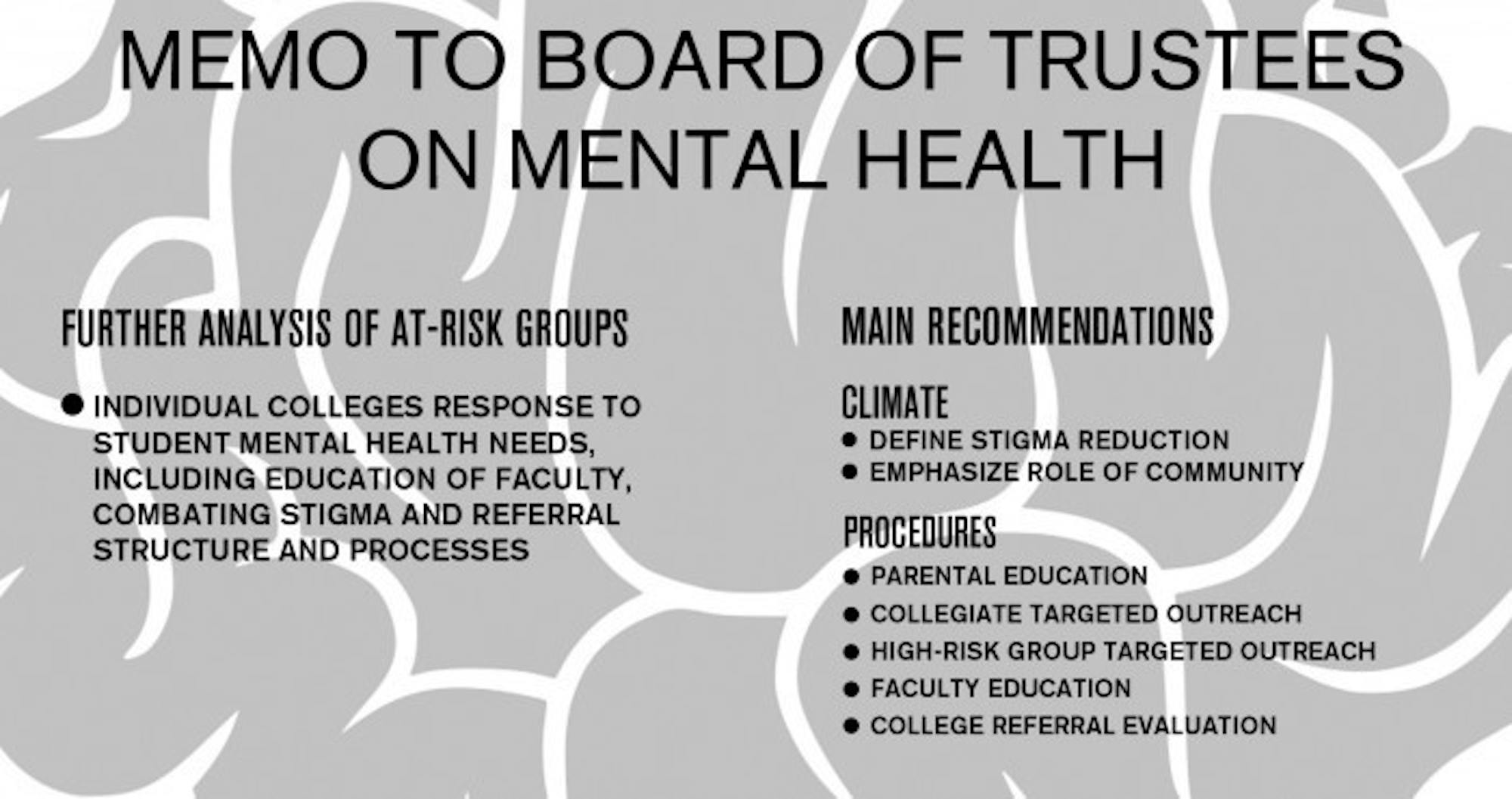
Student government compiled its new research and recommendations on mental health in a memo to the University Board of Trustees.
Student body president Bryan Ricketts said the memo is an extension of a report on student stress and mental health written by Lauren Vidal and Matthew Devine, last year’s student body president and vice president, as well as Shannon Montague, their chief of staff.
“We thought it was a great conversation,” Ricketts said. “Their look at student stress examined how conditions can exacerbate mental illness, or even create it for the first time. Now we’re examining some of the leftover questions, looking more at the actions taken to help students with mental illness.”
Dan Sehlhorst, student body chief of staff, said the memo contained a further analysis of mental illness in relation to high-risk groups on campus, as well as information about individual colleges’ responses to student mental health needs.
Sehlhorst said student government issued two main recommendations in the memo, suggesting changes to address the climate and procedures related to mental illness on Notre Dame’s campus.
Ricketts said student government defined stigma reduction and emphasized the role of community as segments of its recommendation about the climate surrounding mental illness on campus.
“Through a combination of academic research, campus research and data analysis we did over the summer, we were able to sit back and decide what we, as a student government, want to accomplish this year,” he said.
Sehlhorst said the memo addressed five procedures related to mental illness — parental education, collegiate targeted outreach, high-risk group targeted outreach, faculty education and college referral education.
Educating parents about the mental health resources on campus could help them provide support to their children in times of need, Sehlhorst said.
“We want to help parents know better how to refer their students if they were identifying signs that they needed some additional help — maybe they’re way too stressed over the phone, maybe they’re really depressed,” he said.
Vidal and Devine’s report highlighted freshman students and international Asian students as those with a higher risk of stress-related mental illnesses, Sehlhorst said.
“We identified five additional high-risk groups: LGBTQ students, racial and ethnic minorities, students who have a background of high socioeconomic need, men and non-Catholic students,” he said. “Each of those groups face mental health issues in a different way. They often face different types of mental health issues, so they need to all be dealt with in a specific way.”
Sehlhorst said different on-campus organizations have close relationships with different demographics, allowing them to serve as a resource for different high-risk groups.
The memo also notes the importance of faculty education about the mental health resources on campus, such as the Campus Assessment Response and Education Team (CARE Team), Ricketts said.
Sehlhorst said student government suggested broader faculty training programs to teach faculty members about ways to recognize mental illnesses and how to help put students in touch with the resources available to them.
“It would start with the actual training … so they know the warning signs and resources available,” he said. “A lot of colleges do this really well already. Basically, what we are identifying is we can still improve even further.”
Ricketts said it is important to continue the collaboration between the different colleges at the University, continuously evaluating the best way to help students access the resources they need.
“These are all ideas, initiatives that we’re using to frame how we’re dealing with mental health and how we’re engaging with administrators and the colleges on mental health issues,” he said.
To address mental illness, student government has also created a department of health and wellness and assisted in the development and promotion of the McDonald Center for Student Well-Being, Ricketts said.
Members of the Notre Dame community have vocalized their desires to address mental illness on campus, Ricketts said.
“This is an issue that affects students, and we want to make sure we’re continuing that dialogue and continuing student engagement with the issue,” he said.













